October 25, 2025 | 14:06 GMT +7
October 25, 2025 | 14:06 GMT +7
Hotline: 0913.378.918
October 25, 2025 | 14:06 GMT +7
Hotline: 0913.378.918
Viet Coconut 78 Agricultural Services Cooperative has established the brand “Tay Ninh peeled coconut”, pioneering the use of QR codes on each fruit and opening the journey for local coconuts to reach wider markets.
Amidst the lush green coconut groves in the sunny and windy land of Tay Ninh, Mr. Nguyen Van Tien, Director of Viet Coconut 78 Agricultural Services Cooperative, is writing a new chapter for his hometown’s produce. Going beyond selling whole fresh coconuts, the cooperative has built the “Tay Ninh peeled coconut” brand, taking the lead in attaching QR codes to every fruit and paving the way for local coconuts to access major markets.
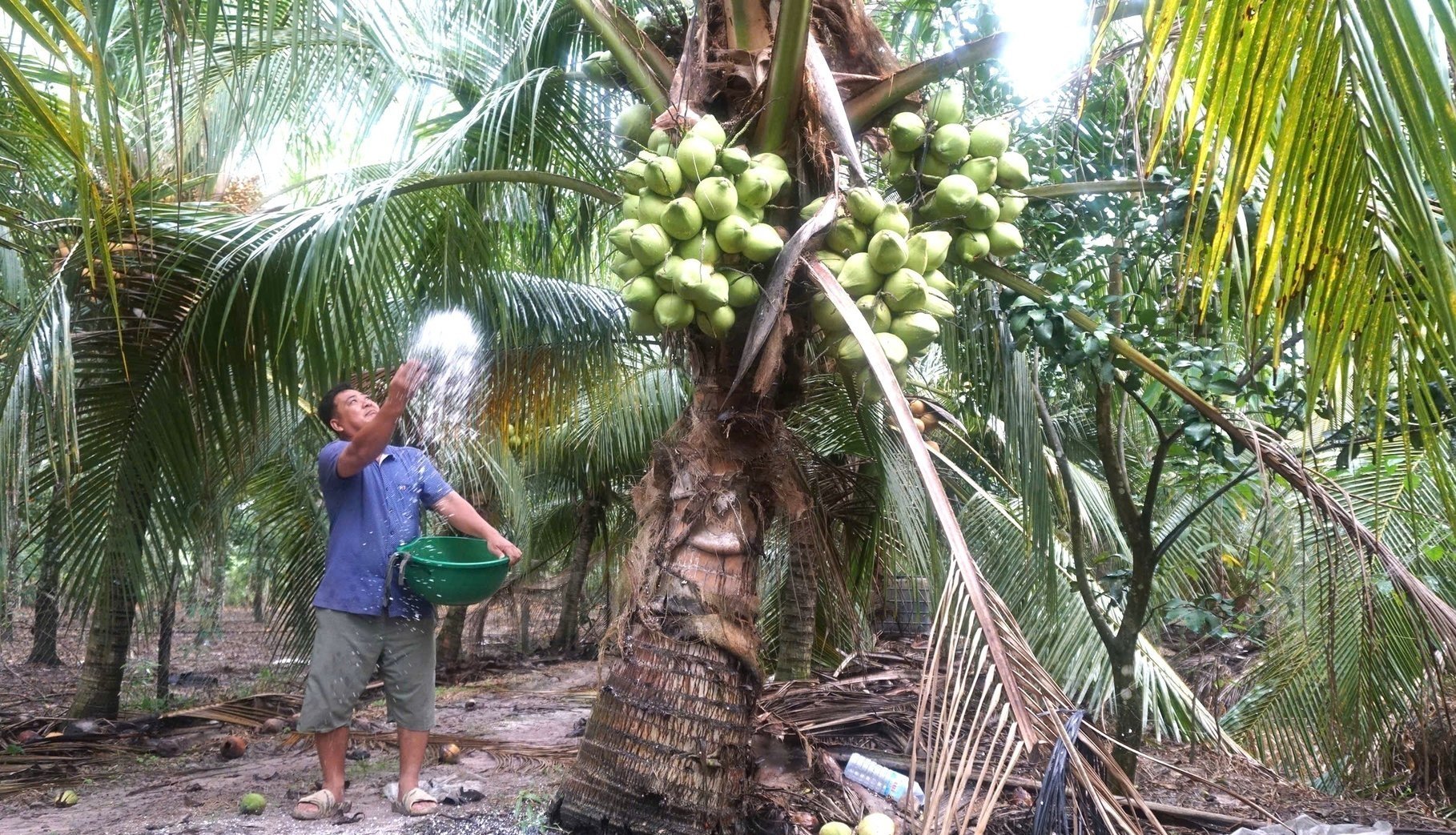
Sea salt is widely used by Viet Coconut 78 Agricultural Services Cooperative to prevent pests and enhance the sweetness of coconuts. Photo: Tran Trung.
Holding a freshly peeled, glossy coconut in his hand, Mr. Tien shared: “Coconut is not just a refreshing fruit. Organic fresh coconuts carry both health and spiritual value. Today’s consumers prefer natural products, so I want every drop of coconut water and every slice of coconut meat to be pure and safe.”
At Viet Coconut 78 Cooperative, coconuts are grown in a completely natural environment, without the use of chemical fertilizers or synthetic pesticides. Thanks to this, the products retain their light sweetness, distinctive fragrance, and high level of safety. Yet, a paradox remains: Tay Ninh coconuts are no less delicious than those from the Mekong Delta - in fact, they are often sweeter - but to reach the market, they still had to be transported “downstream” to provinces like Tien Giang and Ben Tre. This challenge inspired Mr. Tien to invest boldly in a local processing facility so that Tay Ninh coconuts could proudly enter the market under their own brand.
Currently, the market favors coconuts peeled to a bright white finish. Viet Coconut 78 has chosen a distinctive approach - naturally whitening the fruit with lemon juice. This age-old method not only acts as a natural disinfectant but also helps preserve the coconut’s freshness and flavor.
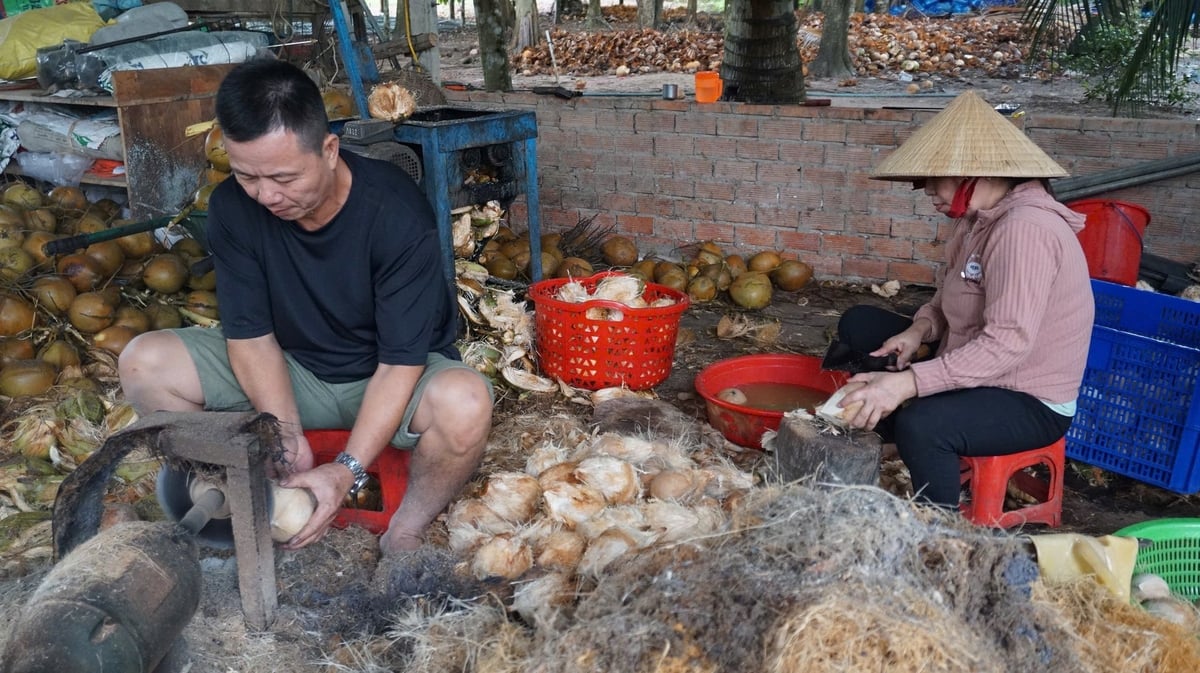
The fresh coconut processing facility of Viet Coconut 78 Cooperative. Photo: Tran Trung.
“Limes in the Mekong Delta are available year-round, with abundant supply and affordable prices. We buy them and process the juice for storage. During processing, coconuts are immediately soaked in lime juice solution, which prevents bacteria and mold while keeping the fruit naturally white,” Mr. Tien explained.
This method, however, is not easy. In the beginning, many distributors refused to take the product because it was not as perfectly white as chemically treated coconuts. Yet the cooperative remained steadfast in its principle of being “clean at heart.” “For consumers accustomed to chemically bleached coconuts, the taste may feel different at first, but once they try it, they can truly appreciate the authentic aroma of coconut,” he shared.
According to Mr. Tien, in the past, Tay Ninh coconuts after harvest were primarily sold in traditional markets: sellers displayed them on stalls, and buyers decided whether to purchase based on appearance, a quick taste, or personal familiarity with the vendor.
Such a system meant that consumption relied entirely on customers' subjective perceptions of the coconut’s sweetness and quality. As a result, the product could not fully demonstrate its true value, making it even more difficult for coconut farmers to establish a lasting reputation.
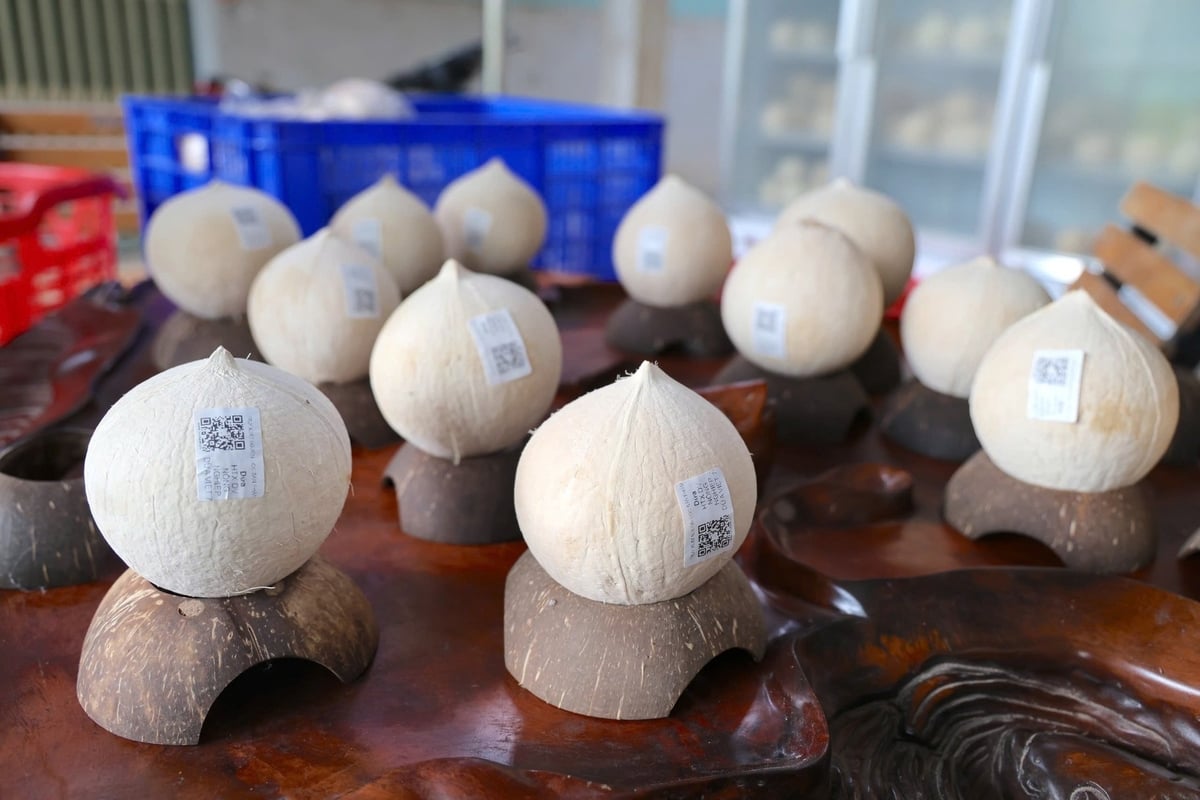
QR codes – the “identity card” for organic coconuts. Photo: Tran Trung.
Since the establishment of Viet Coconut 78 Agricultural Services Cooperative, the way of doing business has completely changed. Each coconut now carries its own “identity card” — a QR code printed on the label. Embedded in the code is detailed information about the farming process, organic standards, growing area, and harvest date.
With a simple smartphone scan, consumers anywhere can verify the coconut's clear origin. They can learn which variety it is, whether it was cultivated under VietGAP or organic standards, and whether the production process strictly adhered to safety requirements.
“What I hope is that whether in Tien Giang, Ben Tre, or anywhere else, when customers drink a Tay Ninh coconut, they will know exactly who grew it, where it came from, and how it was cared for,” Mr. Tien shared. For him, transparency is the most effective way to build market trust while safeguarding the reputation of producers.
Attaching a QR code is not just a technical step but a turning point in brand building. It has lifted Tay Ninh coconuts out of the shadow of ordinary produce – once found only in traditional markets – into a branded product with its own story and added value. The QR code allows the cooperative to prove that its coconuts meet the standards required to enter supermarket chains and convenience stores and, ultimately, to serve export markets.
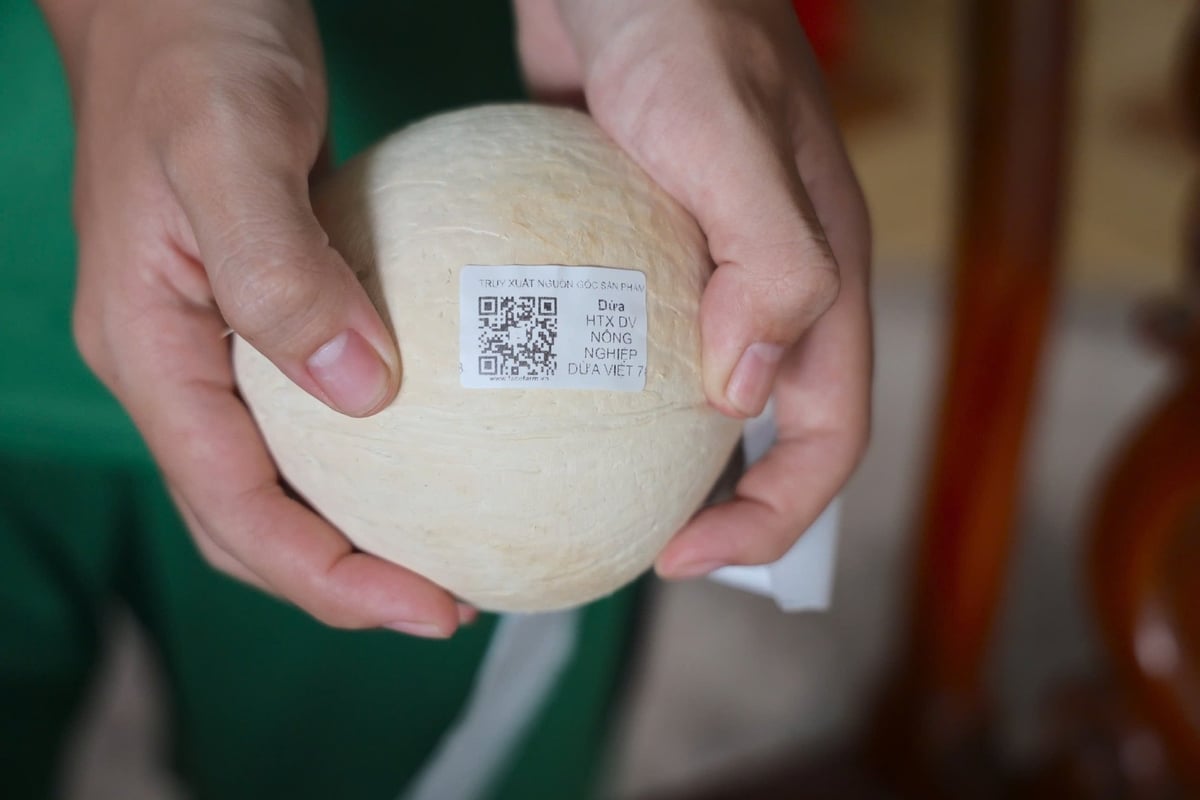
Adding QR codes to coconuts is not entirely new, but it marks a turning point from small-scale production to a brand-building mindset. Photo: Tran Trung.
For farmers, this is no longer just about “selling a coconut” as before. Each coconut has now become a product that carries with it a whole journey, from the farm to the dining table, from clean production processes to brand-building strategies. This shift creates opportunities for the entire Tay Ninh coconut-growing area to benefit: once the product is recognized and valued by the market, its economic worth rises, farmers’ livelihoods improve, and a solid foundation is laid for sustainable development.
Coconuts have long been more than just a familiar tropical fruit; they are also a highly sought-after commodity in the global market due to their nutritional value and wide range of uses. In the context of rising demand for organic produce, especially in developed countries where consumers have higher incomes and a strong health awareness, Vietnam’s organic fresh coconuts have achieved remarkable growth. Over the past three years alone, import demand for fresh coconuts from Vietnam has risen by an average of 15–20% annually, opening up many new opportunities for the coconut industry.
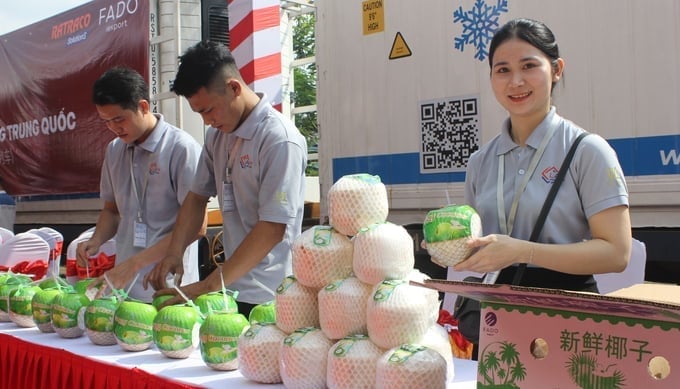
Enterprises preparing fresh coconuts for export to China. Photo: Tran Trung.
However, opportunities always come with challenges. The surge in fresh coconut exports to the Chinese market has left many domestic processing enterprises short of raw materials, with some even forced to operate at minimal capacity. On the international stage, competition is becoming increasingly fierce, particularly with Thailand - a country that has long outpaced Vietnam in both production costs and processing technology. Meanwhile, Vietnam’s coconut value chain still faces numerous weaknesses, especially in deep processing and product diversification, which limits the industry’s ability to enhance value and strengthen competitiveness.
Dr. Tran Minh Hai, Deputy Rector of the Institute of Public Policy and Rural Development, emphasized that the key to boosting fruit exports, including coconuts, lies in the cooperative model. “Enterprises should form linkages through cooperatives to manage planting area codes, organize production zones, and control output. Cooperatives are not only technical hubs but also strategic partners in logistics and product quality management,” Mr. Hai stressed.
According to Dr. Hai, a new trend is emerging as large-scale coconut plantations for drinking coconuts are gradually shifting to the Southeast and Central Highlands rather than being concentrated only in Ben Tre, Tien Giang, or Vinh Long. Many plantations in the Southeast now cover 30–50 hectares, have been granted planting area codes, and are capable of consistently supplying products for export.
However, he also cautioned that there is a fundamental difference between coconuts grown for drinking and those grown for oil. If the wrong variety is selected or harvesting is done at the wrong time, the coconut water may deteriorate during international shipping, posing significant risks for enterprises.
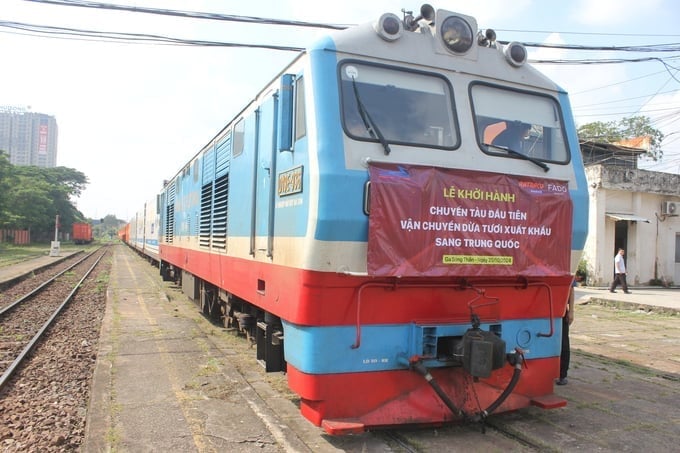
The first shipment of fresh Vietnamese coconuts exported to China. Photo: Tran Trung.
Vietnam’s fresh coconut exports are facing tremendous opportunities, but to fully pave the way into global markets, the industry must soon complete its value chain and strengthen the linkages between enterprises, cooperatives, and farmers. Only then can Vietnamese coconuts secure a truly strong and lasting position in the international market.
Translated by Phuong Linh

(VAN) On October 23, Gia Lai hosted the Thailand-Gia Lai Investment Promotion Conference 2025 under the theme 'Discover Gia Lai, Vietnam - Breakthrough in trade and investment.'
/2025/10/23/1837-9-121127_285.jpg)
(VAN) Ho Chi Minh City is building an agricultural innovation ecosystem from research to production, aiming at a green, high-value, sustainable, and climate-resilient agriculture.

(VAN) A combination of practical, preferential policies, streamlined administrative reforms, and integrated infrastructure is transforming Bac Ninh province into an attractive destination for investors, particularly in the high-tech agriculture sector.

(VAN) Leveraging its natural advantages and strong business investment, An Giang’s pangasius industry is expanding its export markets and moving toward a sustainable development model.

(VAN) Localities have proposed the early issuance of common standards, maintenance norms, and investment mechanisms for digital transformation equipment in the irrigation sector.
/2025/10/17/3246-4-212816_905.jpg)
(VAN) Phuc Sinh Corporation has officially been awarded the ISO 14064-1:2018 international certification for greenhouse gas inventory by the TUV NORD global certification organization.
/2025/10/16/4611-4-184059_876.jpg)
(VAN) The Vice President of the Vietnam Seaculture Association offers an in-depth perspective on the journey to affirm the international quality and outstanding economic potential of the seaweed industry.